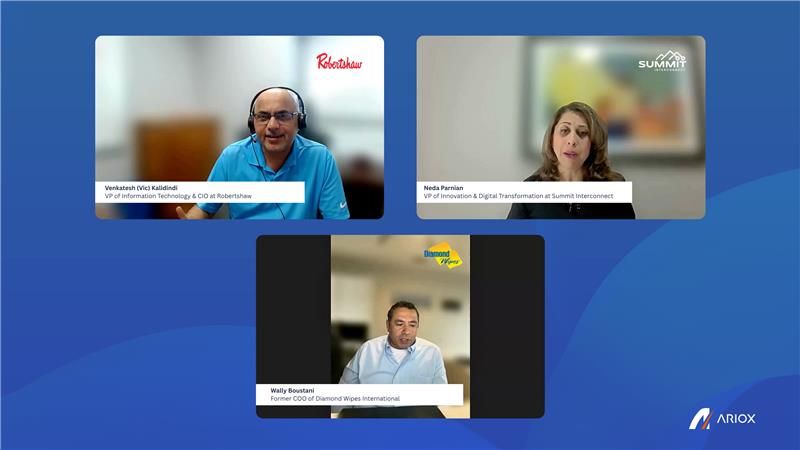Manufacturing in Motion: Ariox '25 Manufacturing Roundtable

Last month, the Ariox team had the opportunity to host our first Manufacturing Leaders Roundtable, a virtual event designed to bring some of the brightest minds in manufacturing, operations, and IT together.
With attendees representing various disciplines of the manufacturing landscape from industrial machinery and automotive to consumer goods and aerospace, the event served as a platform for cross functional collaboration, idea exchange, and strategy development.
One of the most popular topics of conversation that seemed to make its way into every session was the growing pressure manufacturers face to modernize while maintaining operational continuity. Digital transformation, once seen as a far-off concept, now acts as its own function of businesses of all kinds. But transformation isn’t just about tools, but rather organizational alignment. Speakers and attendees alike emphasized that enterprise technology must evolve beyond a service function, and act fully as a strategic partner. Technology decisions are no longer siloed; they now need to reflect, inform, and accelerate broader business outcomes. The CIO is at the table not just to integrate or deliver systems, but to shape the overall vision of the organization.
Equally front and center of the discussion was the theme of innovation as an urgent priority that is helping shape decision-making in real time. The pressure to innovate and evolve is being driven not only by internal demands, but also external matters like shifting customer expectations, supply chain volatility, workforce constraints, and rising operational costs.
This is where the role of integration came into sharp focus. As one attendee put it, “We’re not short on tools—we’re short on tools that talk to each other.” The future of innovation in manufacturing isn’t just about deploying individual point solutions. It’s about creating a connected environment where every tool, process, and stakeholder is working from the same operational truth. And that requires flexible, low-code integration platforms that empower both IT and operations teams to build and iterate without weeks of dev time.
Several conversations focused on how automation and AI are moving from buzzwords to budget lines, as manufacturers seek to increase throughput, reduce waste, and build smarter workflows. The tension between rapid innovation and risk mitigation came up often: how do you pilot new tech without disrupting legacy systems? How do you train teams on new tools while still hitting production KPIs? The takeaway was clear—manufacturers need integration strategies that support experimentation while protecting core operations.
Supply chain resilience was another focal point. The past few years have underscored how fragile global networks can be, and leaders shared how they’re adapting to this new reality. While some organizations are investing in diversified supplier bases, others are turning to systems integration to gain better visibility across vendors, facilities, and production lines. Data-driven forecasting and cross-functional coordination were recurring strategies, with several attendees noting that observability is often the first step toward flexibility.
The three featured panelists each brought a distinct but complementary perspective. Venkatesh (Vic) Kalidindi, CIO of Robertshaw, shared lessons on the strategic role of IT in enabling global transformation, particularly in balancing central governance with local execution. Neda Parnian of Summit Interconnect spoke compellingly about building innovation into the DNA of an organization—from frontline processes to board-level decisions. And Wally Boustani, drawing from his time as COO of Diamond Wipes, reminded attendees that sustainable growth is as much about systems as it is about people. Technology, in his view, must amplify human capability—not replace it.

Perhaps the most meaningful outcome of the event wasn’t just the knowledge shared, but the connections formed. The Roundtable offered a rare space for open dialogue—one where VPs of Ops could compare strategies with IT directors, and digital transformation execs could swap lessons learned with manufacturing engineering leaders. Many attendees shared follow-up messages expressing appreciation for the candor and camaraderie, and we’ve already seen interest in forming ongoing working groups to continue these conversations.
As we reflect on this event, we’re energized by the community it cultivated. At Ariox, we believe that integration is more than a technical function—it’s a strategic enabler of agility, insight, and innovation. The Manufacturing Leaders Roundtable reinforced that belief and gave us a renewed sense of purpose as we continue to build platforms that empower teams to do more with what they already have.
We’re already thinking ahead to the next event. In the meantime, thank you to everyone who joined us in May. Check out a recording of the event here.
Want to stay up to date on upcoming events just like the Roundtable? Subscribe to our newsletter to be kept in the loop.